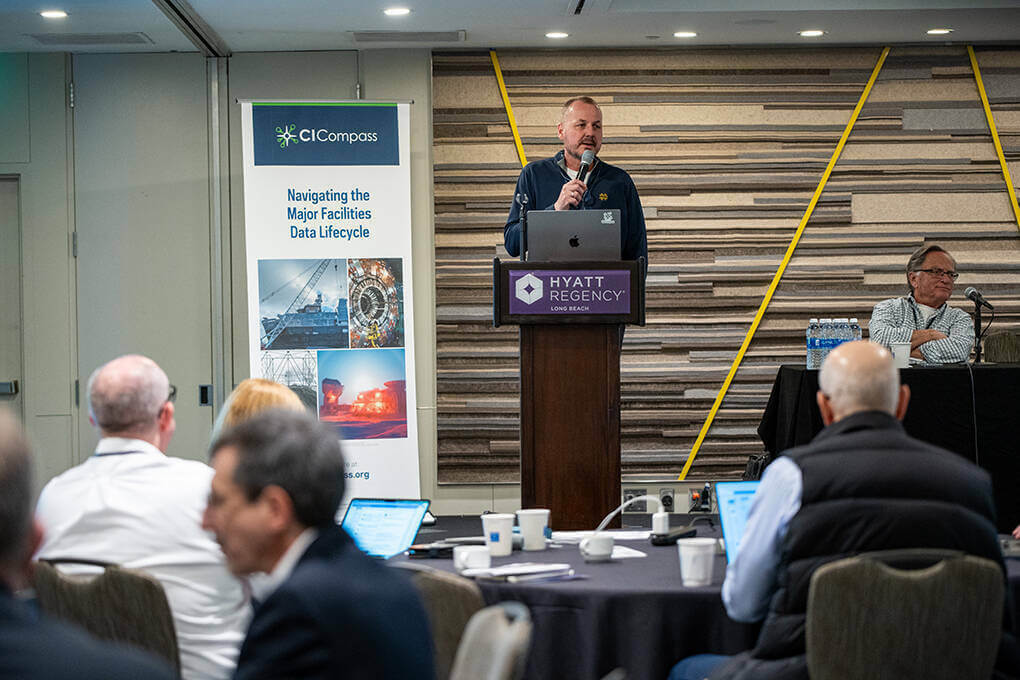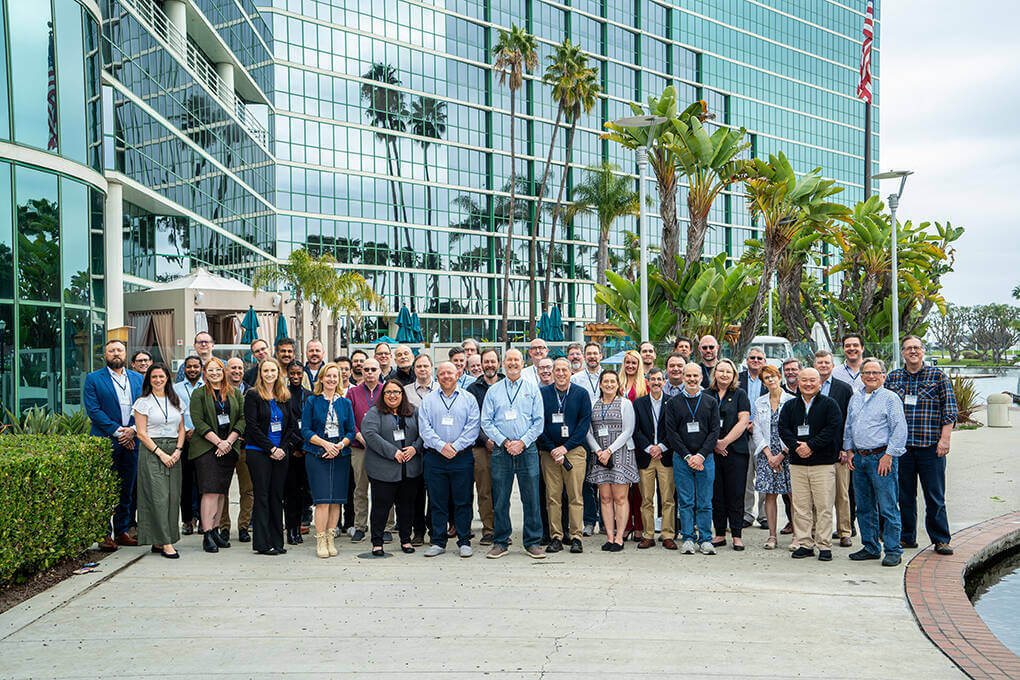
A computer scientist working in high throughput computing crossed a room at the networking event with a fresh coffee to speak with another scientist focused on optimizing infrastructure on research vessels that spend months on the ocean. A member of a supercomputing center found himself discussing challenges with a computer scientist at a major research observatory over lunch. Each of these conversations took place between members of the cyberinfrastructure community working with U.S. National Science Foundation (NSF) Major Facilities (MFs) at CI Compass’s 2024 Cyberinfrastructure for NSF MFs worksop (CI4MF) in Long Beach, California, in January. The theme for the 2024 CI4MF workshop, “Collaboration in Action,” ring true throughout the event.
The event brought together around 60 cyberinfrastructure (CI) practitioners, cybersecurity experts, computer scientists, researchers, FAIR (findable, accessible, interoperable, and reusable) data experts, and more, to have discussions that impact the research and discoveries made by the NSF’s MFs. The opportunity to collaborate with others outside of each scientist’s specific discipline is one of the key things that made this event valuable to the facilities that participated.
Collaboration in Action
Katie Antypas, office director, NSF Office of Advanced Cyberinfrastructure, helped kick off the CI4MF workshop as the keynote speaker. Antypas spoke of “Leveraging NSF’s Cyberinfrastructure to Support Major Facilities Research.”
“With large scientific instruments and facilities producing increasing amounts of data that need to be moved, analyzed, curated, and shared, it is absolutely critical to form deep partnerships with the cyberinfrastructure community and the major facilities community in order to advance scientific discoveries,” said Antypas. “Workshops like CI4MF are crucial to bring together multiple communities to share best practices, expertise, and lessons learned across a wide range of science domains and experiments.”
In other words, when the scientists and developers at the NSF MFs work together, they often find new and innovative ways to apply and improve technology in their own research communities.
The workshop was structured to give speakers from a diverse range of disciplines the opportunity to connect and find new ways to solve challenges in research infrastructure. During the workshop, there was one keynote speaker, two invited talks, two moderated panel discussions, two breakout sessions, seven lightning talks, one data visualization demo, and plenty of time in between sessions for attendees to connect and network.
The lightning talks were led by Nicole Virdone, CI Compass project manager and director of outreach. Virdone also played a key role in organizing speakers, guests, and the agenda itself. Because of that organization, guests in attendance were encouraged to engage with panelists and speakers, gaining new insights into how to pivot the cyberinfrastructure strategy at their own institutions.
“CI Compass aims to build the community around cyberinfrastructure,” said Ewa Deelman, director of CI Compass and research professor and director of scientific automation technologies at the University of Southern California. “Since the center’s establishment by the NSF in 2021, and its pilot in 2019, we have been working together to advise Major Facilities on their data lifecycle make connections and partnerships with research facilities and people who have expertise in technologies and approaches that they can share with facilities that may be looking to update or restructure a portion of their cyberinfrastructure."
Breaking out, together
The workshop included a wide variety of ways to engage with the audience and attendees on broad topics that impact the CI community.
Moderated panels and guided discussions included:
-
The NSF Major Facilities Approach to Open Science: FAIR Data, Persistent Identifiers, etc.
-
Coordinating and Combining Data Processing, Movements, and Storage
-
“If I knew then what I know now, I would have never designed it this way": Approaches to CI Conceptualization and Design.
-
Table top discussions about the needs and challenges for the MFs.
Two moderated breakout sessions ran concurrently. One breakout session, “Making MF Data More Accessible: Data Visualization and Analytics,” was guided by Valerio Pascucci, CI Compass co-principal investigator and professor at the Scientific Computing and Imaging Institute, University of Utah, along with Dan Stanzione, associate vice president for research at the University of Texas-Austin and executive director of the Texas Advanced Computing Center (TACC).
This session included dialogue from researchers associated with the Large Hadron Collider, CyVerse, Woods Hole Oceanographic Institution, the newer mid-scale facility - Compact X-Ray Free-Electron Laser (CXFEL), and more. The topics guiding the conversation included “What are your main CI data visualization and analytics needs that are preventing you from accomplishing your tasks or causing waste of time or other resources?” and “If you had a limited budget increase, what would be the top need that you would want to address to improve Data Visualization and Analytics in your operations?” The discussion turned to the challenges and opportunities of visualizing data at each facility.
Another session, “Use of National CI for MFs and Their Users,” was guided by Jarek Nabrzyski, co-principal investigator of CI Compass, founding director of the Center for Research Computing and concurrent professor of Computer Science and Engineering at the University of Notre Dame, and Miron Livny, chief technology officer and professor at the Wisconsin Institute for Discovery at the University of Wisconsin-Madison.
The conversation led by Nabrzyski and Livny had multiple guiding questions, though the breakout session began by first defining what advanced CI was, including NSF-funded advanced computational resources, scientific clouds, storage resources, and software/systems support, among others. Dialogue from researchers included input and questions from NoirLab, the Laser Interferometer Gravitational-Wave Observatory (LIGO), IceCube, and ORCID. The conversation made its way to include the broad scope of issues, such as the current usage of CI, challenge identification, aspirations, requirements in CI for MFs, finding collaborations and support, gaining feedback on current structures, building future-ready infrastructure, and engaging with user communities to understand the needs the CI must serve.
“Our discussion was dominated by conversations about the need for long-term data storage and archives. This is a huge need in the NSF MFs, and is a problem that is not yet solved on a national scale,” said Nabrzyski of the breakout session after it ended. “Assessing the needs of the MFs with regard to long-term storage and data archive will be an important task for CI Compass going forward.”
Don Brower, CI Compass FAIR data expert and research assistant professor and computational scientist at the University of Notre Dame, led a panel titled "Major Facilities Approach to Open sciences: FAIT Data, Persistent Identifiers, etc."
Post-CI4MF activities
CI Compass leadership has sent a post-workshop survey to registered attendees of the 2024 CI4MF workshop. These results, paired with a summary of each session submitted into a formal workshop report, will be evaluated by the center’s leadership. The workshop report will be released to the community when completed and approved.
Recorded sessions of the workshop will be made available in the coming weeks on the CI Compass 2024 CI4MF workshop website page, with announcements and further articles posted on the CI Compass LinkedIn and X accounts as the material is published.
Stay up to date with CI Compass’s events and activities by visiting ci-compass.org.

About CI Compass
CI Compass is funded by the NSF Office of Advanced Cyberinfrastructure in the Directorate for Computer and Information Science and Engineering under grant number 2127548. Its participating research institutions include the University of Southern California, Indiana University, Texas Tech University, the University of North Carolina at Chapel Hill, the University of Notre Dame, and the University of Utah.
To learn more about CI Compass, please visit ci-compass.org.
Contact: Christina Clark, Research Communications Specialist
CI Compass / Notre Dame Research / University of Notre Dame cclark26@nd.edu / 574.631.2665
ci-compass.org / @cicompass
Originally published by at ci-compass.org on February 29, 2024.